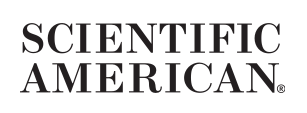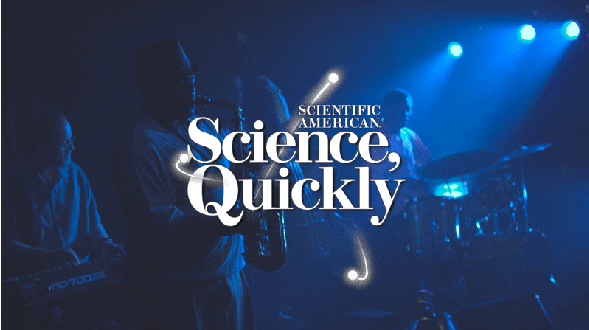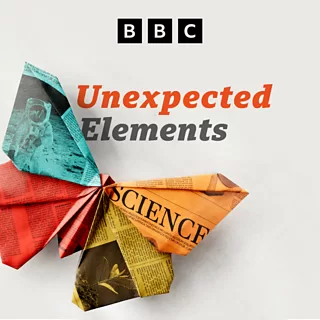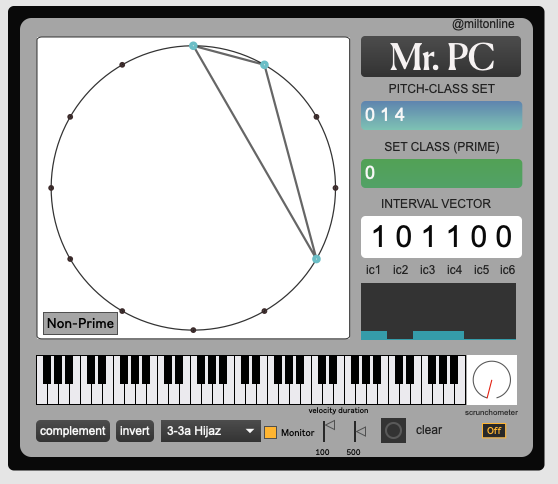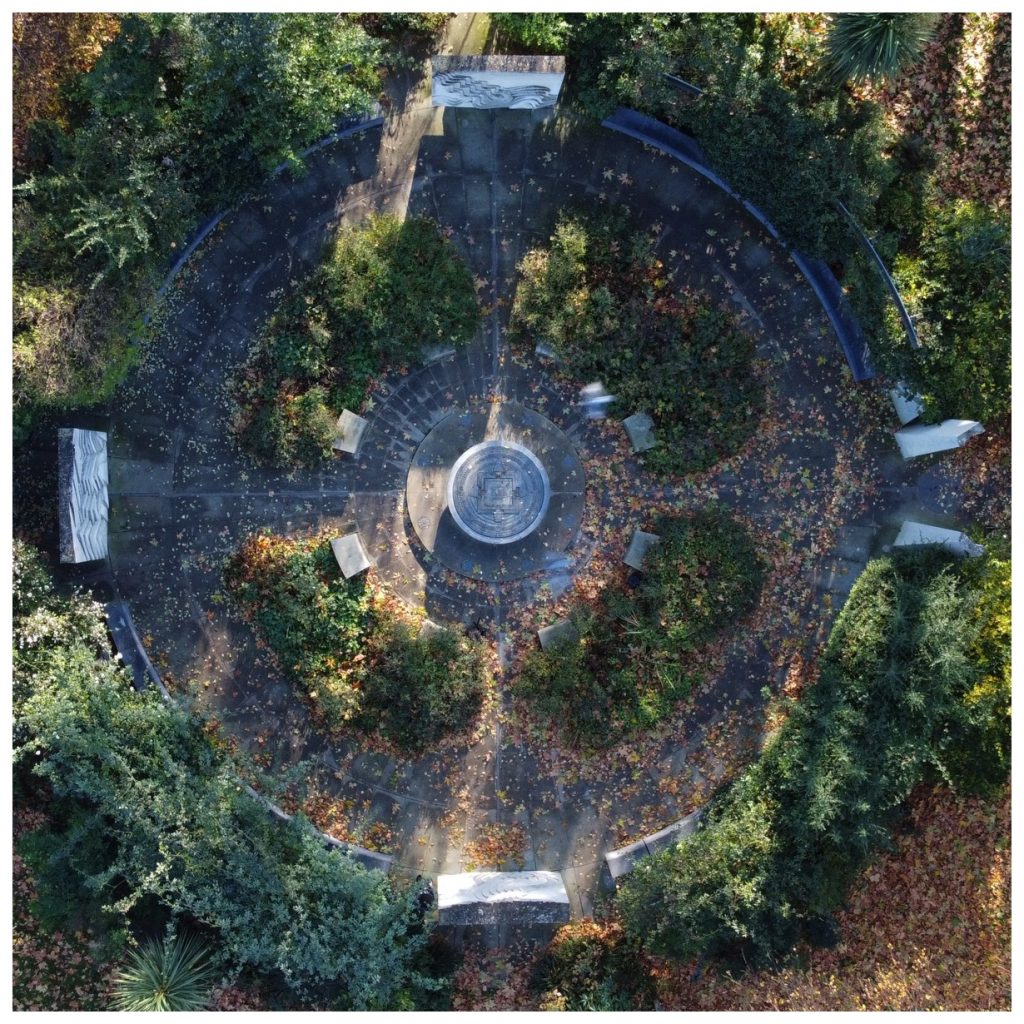How Jimi Hendrix broke the axes of music.
Category: Composition
Shedding light on Pink Floyd’s masterpiece.
Emergence in Minimalism and Process music from Africa to Arvo Pärt.
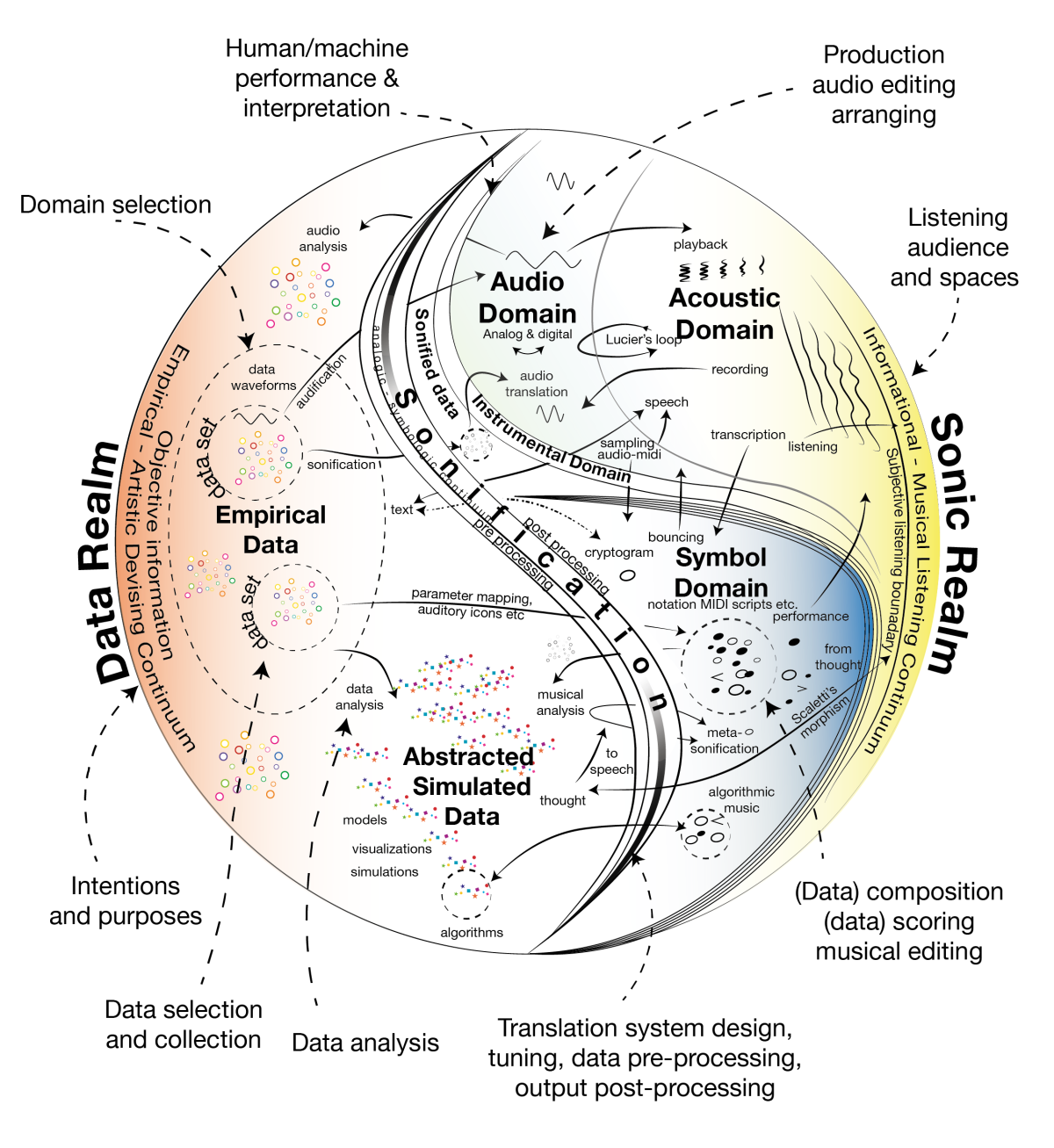
Hidden Music – The Composer’s Guide to Sonification (Mermikides 2025, Cambridge University Press) reveals the what, how and why of sonification and data music practices; and their role and potential in scientific and artistic communication.
ISBN 978-1-009-50031-9 Hardback
ISBN 978-1-009-25857-9 Paperback
ISSN 2633-4585 (online) online edition
ISSN 2633-4577 (print)
Publishers site: www.cambridge.org/9781009500319
Sound and music hold a strange and powerful role in film, TV and video games, aiding narrative and emotional impact. They can even exist in the world of ‘the film’ – heard by the characters – or in the world of the audience. Music can even break the fourth wall, travelling through and blurring these conventionally separate worlds. By examining films through history from Blazing Saddles, Elf, The Truman Show toBirdman, we explore this ‘fantastical gap’ and its transformative effect on the audience.
Part of:
This event was on Thu, 16 Jan 2025
Great to be involved in this Scientific American podcast episode unpacking micro-timing expression (‘swing’, ‘time-feel’ etc) with the brilliant Nina Kraus, Theo Geisel and Charles Keil. Thanks to host Joe Polidoro.
A discussion on sonification and the intersection of science and music on the Unexpected Elements science programme, broadcast July 6 2023 on BBC World Service and BBC Sounds.
Available here as well as on all other platforms. (The Coolest Science section starts at around 29:25 minutes).
Phibonacci Nova 2023
A remake (with animation and updated music) of the 2011 Phibonacci Nova – A Bossa about the Fibonacci Series featuring Bridget Mermikides on vocals and vocal arranging.
Forget all my moon phases and compasses, this is super useful practical tips to compose with modes. 7 tips to use in your compositions of any style.
“Hidden music” is a talk given in the interdisciplinary seminar series on Eudaimonia and Human Flourishing on 24.05.2022 at Linacre College, Oxford University. The talk is in two conceptual halves: The nature of music and the music of nature. For info and to watch the talk click below.
Every chord in the (12TET) Universe – a gentle introduction to Pitch-class Set Theory.
To download the Mr. PC patches (for Max/MSP standalone and Max for Live click below. Note: 1) they both need the excellent and free Bach package by A. Agostini & D. Ghisi (installable in Max’s Package manager) consider donating (to them). 2) For Apple Silicon computers, Max needs to be running under Rosetta. 3) These are good enough tools for teaching and music adventure – use at your own theoretical risk.
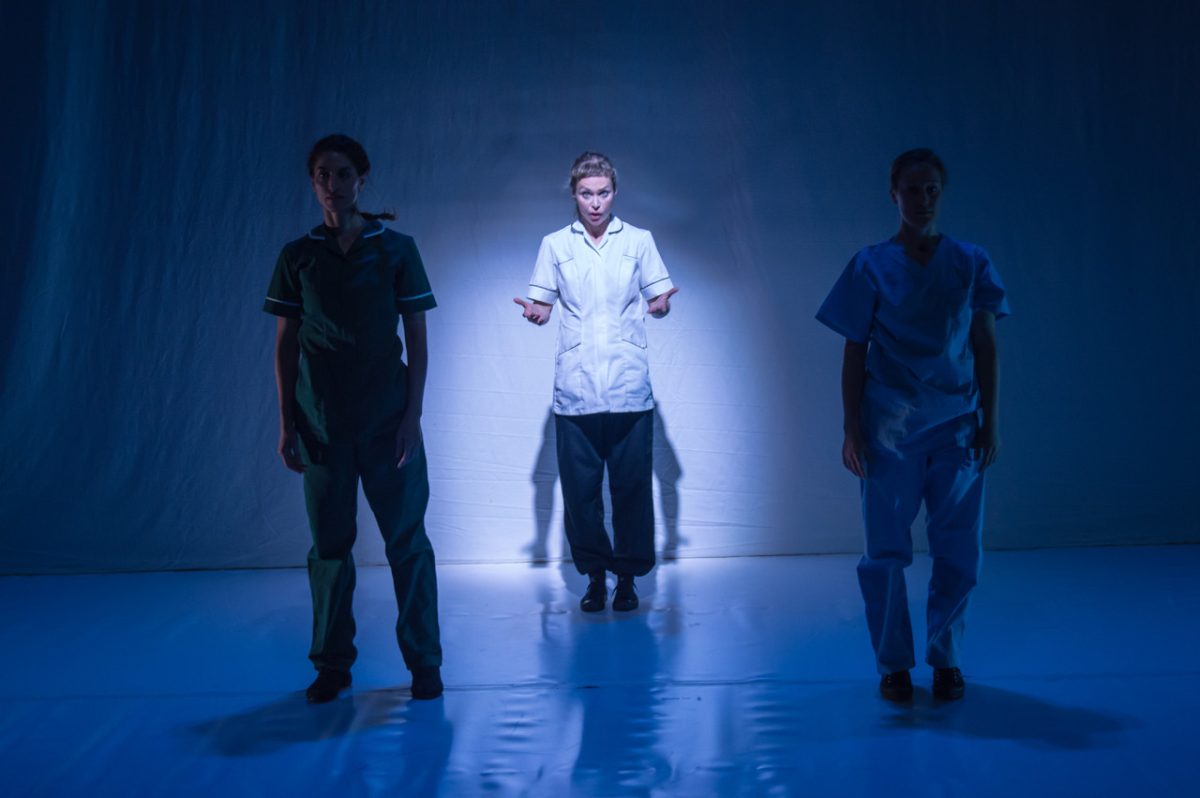
‘Taking Care’: supporting and recognising nurses’ caring role
GSMD article
UK nursing trainees are better prepared to deliver patient-centred care as a result of ‘Taking Care’, a mixed-methods drama research project undertaken by researchers at the Guildhall School of Music & Drama and Kingston University. This joint project was awarded the highest possible grade in the 2021 Research Excellence Framework.
The project was led by former Doctoral Programme Leader, Dr Alex Mermikides, who was inspired by the nurses she met when her brother Milton was treated for acute lymphoblastic leukaemia – a serious type of blood cancer. Taking Care addresses two challenges facing nurse educators: teaching the sensitive and effective communication of ‘care’ and preparing students for the demanding emotional labour required by their profession. The huge physical and emotional toll nursing can take on staff has been bought into sharp focus over the past two years, but the nursing curriculum hasn’t traditionally taught trainees how to ‘care’ for patients without compromising their own emotional wellbeing.
Mermikides’ ensemble created an interactive drama, Careful, following a collaborative research process with performers and trainee nurses. The process of devising Careful revealed that ‘care’ can be understood as a skilled practice rather than an inherent virtue. The feedback from students on the workshops and performances has been overwhelmingly positive and has led to the materials being rolled out to other nursing schools across the country. As student nurse Michal Kaim reflected in The Guardian, ‘elevating nursing to the level of art gave me another reason to be proud of the choice I have made to become one’. The full performance of Careful can be viewed online.
Keynote Lecture for the World Sleep Congress in Rome, Italy March 2022, examining the use of sonification to communicate and reveal the inner experience of sleep.
A collaboration with Enzo de Sena (Senior Lecturer on the Tonmeister programme, University of Surrey), Deborah Dunn-Walters, Sarah Bailey and Nils Marggraf – sonifying kinship DNA and recognising familial relationships as shared motivic content. A documentary produced in collaboration with University of Surrey was aired on Italy’s Rai 3 flagship science programme Quinta Dimensione (viewership ≈886,000). Segment below.
May 24th 2022 2pm, a lecture for staff, students and public Oxford University’s wonderful new Centre for Eudaimonia and Human Flourishing. Directed by Prof Morten Kringelbach “The Centre undertakes interdisciplinary research into Human Flourishing, Eudaimonia and the Life Well-Lived with a special focus on human brain dynamics through its link with the Department of Psychiatry, University of Oxford and Center for Music in the Brain, Aarhus University, Denmark.”
The talk Hidden Music: Sonic translations of Nature will explore music as a tool for listening, and understanding patterns of the natural world, blurring the boundaries between people and the ‘outside world’, and ‘art’ and science. It will take place in the Pink Seminar Room in Linacre College and streamed online. Details here.
Martino Unstrung (2008, Sixteen Films, dir. Ian Knox) – the Pat Martino documentary I had the unique privilege of scoring – is now distributed through Journeyman Pictures and available for rent, purchase on iTunes, GooglePlay, Vimeo as well as screening requests. A rare insight into a rare artist. https://www.journeyman.tv/film/6605
http://martinounstrungfilm.com

Blue & Yellow
Colours of the Ukraine Flag making their own music.
The Sound Asleep project was presented with Professor Debra Skene in the World Sleep Congress on March 11 2022, Rome, Italy,

World Sleep 2022 is a global scientific congress bringing the best of sleep medicine and research to Rome, Italy, March 11–16, 2022. The World Sleep congress, now in its 16th iteration, consistently gathers the best minds in sleep medicine and research for multiple days of scientific sessions and networking.
Sound Asleep has now been presented at British Sleep Society, European Sleep Research Conference and World Sleep Congress engaging with hundreds of members of the International Sleep Community.
Super happy to be made an Ableton Certified Trainer, and join a wonderful international community of artist-educator-technologists from 56 countries. Just 8 of us from the UK were selected since 2013, so it’s a real privilege. I am of course a technophile (=nerd), but I have a particular love for Ableton Live (and Push) which – now with Max for Live – is incredibly open, flexible, and linked to diverse forms of historical and contemporary music making in composition, performance, production, and programming. I genuinely love Live and Ableton and relate to their musical ethos deeply.

The wonderful New Zealand classical guitarist and professor Matthew Marshall is touring Insighted in his 12-date tour around NZ and Australia (July-August 2021) in a super eclectic programme. Sounds great in rehearsals, what fun. Score now available.
Hidden Music featured in the wonderful New Scientist Podcast

CLP was featured in the Metro newspaper tech section on Friday 13th November 2020. More on the project:
A collaboration with Dr Enzo De Sena, the mutations of the Covid-19 virus over 500 generations are sonified. Every motif is formed by the mutation of successive Covid-19 strains. Although ‘musical’ decisions are made, they are done so not to cloak the data with familiar emotional signs, but to reveal the hidden music of the mutations – as such motivic similarity and variation are the shared language of music and biology. Despite the remarkable amount of change it should be appreciated that Covid-19 is in fact relatively stable, so the hope for an effective vaccine remains.
– Milton
This project tries to sonify the genetic mutations of COVID-19 as they are observed over time. The main aim of the project is to satisfy a personal curiosity and for artistic purposes. However, it is hoped that sonifying the mutations could highlight patterns that would not be picked up otherwise.
The current sonification methodology associates notes’ timing to the position of the mutation within the DNA and pitch to the type of nucleotide mutation (e.g. G->A, or C->T etc). This means that the position of the mutation results in different rhythmic placement, and the type of nucleotide mutation results in different melodies.
– Enzo
To follow the project visit: miltonline.com/covid-sonify
Papers available: J. Weinel, J.P. Bowen, G. Diprose, and N. Lambert (eds.) EVA London 2020: Electronic Visualisation & the Arts. Proceedings of a conference to be held online in November. BCS, The Chartered Institute for IT, 2020. ISBN 978-1-78017-538-6.
Papers online. Published online via ScienceOpen by the BCS: The Chartered Institute for IT, in the series: Electronic Workshops in Computing (eWiC) Electronic Visualisation and the Arts (EVA 2020). DOI 10.14236/ewic/EVA2020.0 – see also DBLP access.

The Careful project has expanded and developed to now support student nurses during the pandemic. The project has been disseminated by The Stage and Medical News Sites.
“A set of drama-based resources to help Kingston University, London nursing students working during the Covid-19 pandemic have been put together through a collaboration with world-leading performing arts school Guildhall School of Music & Drama, London.”
https://www.news-medical.net/news/20200621/Drama-based-resources-help-Kingston-University-nursing-students-to-cope-with-coronavirus-pandemic.aspx
https://www.thestage.co.uk/news/coronavirus-guildhall-creates-online-drama-resources-for-nursing-students

